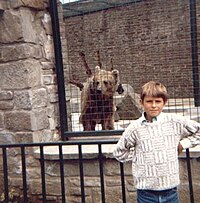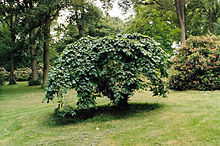| Camperdown House | |
|---|---|
 Camperdown House, June 2006 Camperdown House, June 2006 | |
| Coordinates | 56°29′02″N 3°02′46″W / 56.484°N 3.046°W / 56.484; -3.046 |
| Area | 400 acres (1.6 km) |
| Listed Building – Category A | |
| Designated | 12 July 1963 |
| Reference no. | LB25078 |
| Inventory of Gardens and Designed Landscapes in Scotland | |
| Designated | 1 July 1987 |
| Reference no. | GDL00082 |
 | |
Camperdown Country Park, often known as just Camperdown Park, is a public park in the Camperdown area of Dundee, Scotland. The park comprises the former grounds of Camperdown House, a 19th-century mansion, which was bought by the city in 1946. Camperdown Park is home to a wildlife centre and recreational facilities. It is the largest park in Dundee, stretching to 400 acres (1.6 km). Over 190 species of tree are found in the park.
Camperdown House is the largest Greek Revival house remaining in Scotland. It is protected as a Category A listed building, and the park is included on the Inventory of Gardens and Designed Landscapes in Scotland, the national listing of significant parks.
History
The Camperdown estate was originally known as Lundie, and was bought by Alexander Duncan in 1682. A 16th-century house stood on the estate at this time. Several members of the family served as provost of Dundee during the 18th century. In 1797, during the French Revolutionary Wars, Admiral Adam Duncan (1731–1804) commanded the Royal Navy fleet that defeated the Dutch at the Battle of Camperdown. He was rewarded by being raised to the peerage as Viscount Duncan.
In 1820, his son Robert, 2nd Viscount Duncan, commissioned William Burn to design a new house in the Greek Revival style. The earlier house was demolished, and the new house was completed in 1828. Lord Duncan renamed the house and estate Camperdown in memory of his father's victory, and in 1831 he was created Earl of Camperdown by William IV. The parklands surrounding the house were laid out by Lord Camperdown, with the assistance of his forester David Taylor, who along with his son planted most of the estate's trees between 1805 and 1859.
After the death of the 4th Earl in 1933, the earldom became extinct, and Camperdown was inherited by a cousin, Georgiana, widow of the 7th Earl of Buckinghamshire. On her death in 1937, the contents were sold, and the house followed, being bought by the Corporation of Dundee in 1946. Camperdown Country Park officially opened to the public in 1949.
Camperdown Park has been the host venue for BBC Radio 1's Big Weekend twice, the first time in 2006, and again in 2023. It was due to host in 2020 however it was cancelled as a result of the COVID-19 pandemic. It is the only venue in Scotland to host the event twice.
Aside from hosting BBC Radio 1's Big Weekend, Camperdown Park also hosted Carnival Fifty Six in August 2017, which was intended to be an annual music festival for Dundee, similar to TRNSMT in Glasgow, however, it was cancelled after one year.
Facilities and features

Wildlife Centre
The Camperdown Wildlife Centre is home to over three hundred animals, of fifty different species. The centre contains mainly mammals and birds but also houses several reptile species. The centre is a member of BIAZA (The British and Irish Association of Zoos and Aquariums), which promotes high standards of care for animals in zoo collections.
The park made news headlines in 1986, when "Jeremy", its female European brown bear, bit the arm off ten-year-old Ross Prendergast, who had sneaked into the park after hours. A campaign was launched to stop the bear being put down. The bear enclosure has been enlarged since the incident, and there are now three different bears at the park.
Comet and Star, the two brown bears, were two of the most popular animals at the centre. Comet died in 2016 and Star was joined by three younger bears from another collection. Star died in 2018. One of Britain's rarest mammals, the pine marten, can also be found in the centre. Camperdown Wildlife Centre received its "zoo licence" in September 2003.
In 2007, the park was subjected to an attack by vandals who broke into the zoo and launched an assault on numerous different species. They used weapons including a pick axe, a knife and stakes. As a result of the attack, a fallow deer was left with a large wound on its side, a terrapin's eyes had been gouged out and a snowy owl had become so distressed that it cannibalised its own offspring. Following the incident, two boys, ages 11 and 13, were charged. A total of twenty-five animals had been injured.
Golf course
Camperdown Country Park had an eighteen-hole golf course which was 6,548 yards in length. It was opened in 1959 and became a very popular golf course in the area. During the 1970s the course held the British Police Championship, and (with the Downfield Golf Course) the Scottish Stroke-Play Championship. Following a cost-saving exercise by Dundee City Council, the decision was made to close the course permanently. It closed in April 2020.
Camperdown Elm
Main article: Camperdown Elm
Camperdown is notable in horticulture as the origin of the Camperdown Elm (Ulmus glabra 'Camperdownii'), a short, broad, "weeping" variety of elm. The tree was discovered around 1835–1840 by Lord Camperdown's head forester, David Taylor, who noticed a mutant contorted wych elm branch sprawling along the ground. The earl's gardener produced the first Camperdown Elm by grafting it to the trunk of a normal wych elm (Ulmus glabra). Every Camperdown Elm is from a cutting taken from that original tree and is grafted on a U. glabra trunk.
References
- ^ "Camperdown Country Park". camperdownpark.com. Camperdown Park. Archived from the original on 29 May 2010. Retrieved 17 March 2012.
- ^ "Camperdown Country Park". information-britain.co.uk. Information Britain. Retrieved 17 March 2012.
- ^ Historic Environment Scotland. "CAMPERDOWN HOUSE, CAMPERDOWN COUNTRY PARK (Category A Listed Building) (LB25078)". Retrieved 7 March 2019.
- ^ Historic Environment Scotland. "CAMPERDOWN HOUSE (GDL00082)". Retrieved 7 March 2019.
- "BBC - Radio 1's Big Weekend 2006 - About the weekend". www.bbc.co.uk. Retrieved 25 May 2023.
- Saunders, Emmeline; Sulway, Verity (13 March 2020). "Radio 1 Big Weekend cancelled over coronavirus chaos as gigs and sports pulled". mirror. Retrieved 25 May 2023.
- "The 1975 and Lewis Capaldi to play Radio 1's Big Weekend". BBC News. 30 January 2023. Retrieved 25 May 2023.
- Dingwall, Blair (8 August 2017). "Carnival 56: Everything you need to know about Dundee's biggest music event in a decade". The Courier. Retrieved 29 May 2023.
- Love, Nicola (4 March 2017). "New festival Carnival 56 hopes to put Dundee back on musical map". Daily Record. Retrieved 29 May 2023.
- Crae, Ross. "Dundee's Carnival Fifty Six music festival won't be returning for a second year". The Sunday Post. Retrieved 29 May 2023.
- "Camperdown Park". scottish-places.info. The Editors of The Gazetteer for Scotland. Retrieved 18 March 2012.
- ^ "Camperdown Country Park". aboutbritain.com. Excelsior Information Systems Limited. Retrieved 18 March 2012.
- ^ "Size of bear enclosure set to be increased". The Courier. Archived from the original on 5 June 2011. Retrieved 17 April 2009.
- MacCormick, Alex (28 July 2003). The Mammoth Book of Maneaters - Google Book Search. ISBN 9780786711703. Retrieved 17 April 2009.
- "The History of Both Golf Courses". dundeecity.gov.uk. Dundee City. Archived from the original on 23 December 2012. Retrieved 17 March 2012.
- Keith, Jake. "'Very sad for the people of Dundee' — Camperdown Golf Course officially closes". The Courier. Retrieved 12 December 2020.
External links
![]() Media related to Camperdown Country Park at Wikimedia Commons
Media related to Camperdown Country Park at Wikimedia Commons